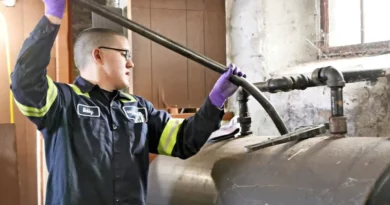The Benefits of Timely Septic Tank Pumping: Saving Money in the Long Run
Owning a home with a septic system comes with its share of responsibilities, including regular maintenance to keep the system operating efficiently. Among these maintenance tasks, septic tank pumping is a critical one that should never be overlooked. While some homeowners might delay or neglect this essential chore, timely septic tank pumping offers numerous benefits, not the least of which is saving money in the long run. In this article, we will explore the advantages of scheduling septic tank pumping on time and how it can lead to significant cost savings.
Understanding the Importance of Septic Tank Pumping
Before delving into the benefits, it’s essential to understand why septic tank pumping is crucial for the health and longevity of your septic system:
- Removal of Solids: Over time, solid waste, sludge, and scum accumulate in the septic tank. Failure to pump the tank results in excessive solids, which can clog pipes, reduce system capacity, and lead to backups.
- Efficient Treatment: Pumping the septic tank ensures that it can effectively separate solids from wastewater, allowing treated effluent to flow into the drainfield for further purification.
- Prevents System Failures: Neglecting septic tank pumping can lead to system failures, requiring costly repairs or even the replacement of the entire system.
- Protects Water Quality: Regular pumping prevents untreated sewage from contaminating groundwater and surface water, preserving water quality and preventing environmental harm.
- Extends System Lifespan: Timely pumping helps maintain the integrity and functionality of the septic system, potentially extending its lifespan and delaying the need for major repairs or replacement.
Cost-Effective Benefits of Timely Septic Tank Pumping
Now, let’s explore the specific cost-effective benefits of scheduling septic tank pumping at the right intervals:
Prevents Costly Repairs:
-
- One of the most significant advantages of timely septic tank pumping is that it helps prevent costly repairs. When the tank becomes overloaded with solids, it can lead to clogs, backups, and damage to pipes and components. Repairing these issues can be expensive and disruptive to your daily life.
Avoids System Replacement:
-
- In extreme cases of neglect, a poorly maintained septic system may need to be replaced entirely. The cost of replacing a septic system can be substantial, far exceeding the expense of routine pumping and maintenance.
Reduces Emergency Expenses:
-
- Septic system emergencies, such as sewage backups into the home, can result in immediate expenses for cleanup, repairs, and potential damage to property and belongings. Timely pumping minimizes the risk of such emergencies.
Preserves Drainfield Health:
-
- The drainfield is a critical component of the septic system. When the septic tank is not pumped regularly, excess solids can flow into the drainfield, clogging the soil and leading to drainfield failure. Replacing a drainfield is a significant expense that can be avoided with proper maintenance.
Extends System Lifespan:
-
- Regular septic tank pumping and maintenance help extend the life of your septic system. By preserving the functionality of the tank and drainfield, you can delay the need for costly replacements and enjoy a well-functioning system for many years.
Prevents Environmental Cleanup Costs:
-
- Neglecting septic tank pumping can result in environmental contamination if untreated sewage leaks into groundwater or surface water. The cost of cleaning up such contamination and potential legal liabilities can be substantial.
Avoids Property Depreciation:
-
- A malfunctioning or poorly maintained septic system can reduce the value of your property. Prospective buyers may be hesitant to purchase a home with septic system issues, leading to a lower selling price.
Lowers Long-Term Operating Costs:
-
- Operating a well-maintained septic system typically incurs lower long-term costs compared to a neglected system. Fewer repairs, fewer pump-outs, and fewer emergencies all contribute to lower overall expenses.
Determining the Pumping Frequency
The frequency at which you should schedule septic tank pumping depends on several factors, including the size of your tank, the number of occupants in your household, and your water usage. Generally, septic tanks should be pumped every 3 to 5 years, but individual circumstances may vary. To determine the ideal pumping schedule for your septic system, consider the following:
Tank Size:
-
- Smaller tanks fill up more quickly and may require more frequent pumping. Larger tanks can go longer between pump-outs.
Household Size:
-
- A larger household with more occupants will generate more wastewater and solid waste, necessitating more frequent pumping.
Water Usage:
-
- High water usage, such as excessive laundry, frequent showers, or running a dishwasher frequently, can lead to a faster accumulation of solids in the septic tank.
Usage Patterns:
-
- Be mindful of any changes in water usage patterns. Events like hosting guests for an extended period or adding additional fixtures to your home may warrant more frequent pumping.
Local Regulations:
-
- Some areas have specific regulations or guidelines for septic tank pumping frequencies. It’s essential to check with local authorities or septic professionals for guidance.
Conclusion
Timely septic tank pumping is not just a routine maintenance task; it’s a cost-effective investment in the health and longevity of your septic system and your property. By avoiding costly repairs, preventing system replacements, reducing emergency expenses, preserving drainfield health, and safeguarding water quality, you can enjoy significant long-term savings.
Don’t wait until you experience septic system problems or emergencies. Take a proactive approach to septic system maintenance by adhering to a regular pumping schedule. Doing so not only protects your finances but also ensures that your septic system operates efficiently, reliably, and environmentally responsibly for years to come.




